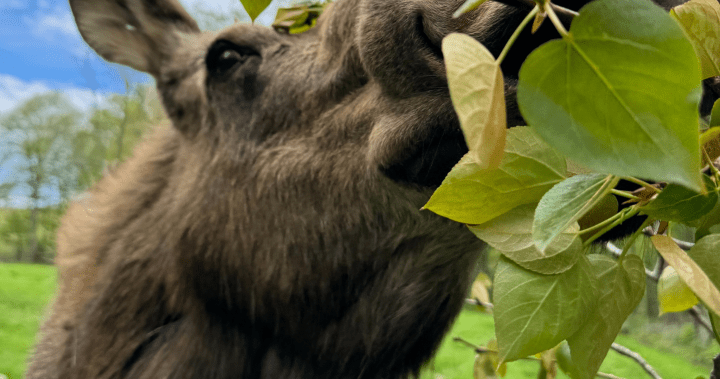The Toronto Zoo recently announced the euthanization of one of its moose, Trilly, after several months of decline in her old age. Trilly was 11 years old, which is beyond the average life expectancy for a moose in human care. Despite the Zoo’s efforts to increase her feed intake, Trilly had lost a lot of condition and had known arthritic changes in multiple limbs. She was quite thin, but still did better than most other moose in similar environments. Trilly also suffered from significant arthritis, including a ruptured tendon on her left hock that led to joint instability and arthritis in at least three out of four pasterns.
The Toronto Zoo described Trilly as a moose that kept the Wildlife Care staff on their toes. She was known to show her “Grumpy ears” if she didn’t get what she wanted and was very protective of her sister, Lilly. The Zoo has more than 3,000 animals representing over 250 species, and losses like Trilly’s are natural occurrences in zoo environments. Despite the sadness of losing Trilly, the Zoo acknowledges that it’s a part of caring for animals in captivity and is dedicated to providing the best possible care for all its residents.
In addition to her arthritis, Trilly had changes in one of her pedal bones related to a hoof abscess. The Zoo made the difficult decision to euthanize Trilly based on recent x-rays and her deteriorating condition. Moose, especially in their old age, can be notoriously hard to feed properly, but the staff at the Toronto Zoo worked tirelessly to try and keep Trilly healthy and comfortable. Unfortunately, her decline was too severe, and the decision was made to prevent further suffering.
The Zoo’s statement about Trilly’s passing highlights the challenges faced when caring for aging animals, especially those with complex medical needs like arthritis. Despite the best efforts of the staff, Trilly’s condition continued to deteriorate, leading to the difficult decision to euthanize her. The Toronto Zoo is committed to providing compassionate care for all its animals, but recognizes that losses are an inevitable part of their work. Trilly’s legacy as a unique and spirited moose will live on at the Zoo, where she captured the hearts of visitors and staff alike.
As the Toronto Zoo mourns the loss of Trilly, they reflect on the impact she had on those who cared for her and the importance of providing quality care for all animals, no matter how challenging their medical conditions may be. Trilly’s passing serves as a reminder of the complexities of caring for aging animals in captivity and the dedication required to ensure their well-being until the end. The Toronto Zoo remains committed to honoring Trilly’s memory and providing the best possible care for all its animal residents, despite the inevitable losses that come with managing a diverse and aging population of species.


